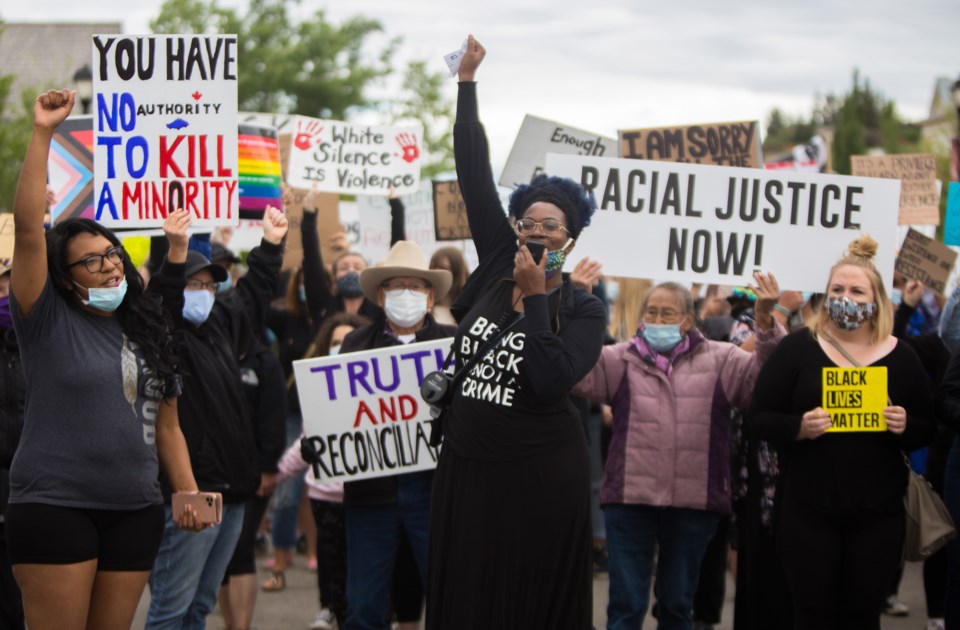COCHRANE— Building on the momentum of the 2020 Cochrane Black Lives Matter Rally, community organizers are continuing to create spaces for difficult conversations and change.
Looking back on the rally is a mix of emotions, said Cochrane community organizer Vanesa Ortiz. Ortiz participated in the June 2020 rally in Cochrane.
“I’m hopeful that more things are coming to light and people are realizing the need of this movement,” Ortiz said. “There is a huge need in Alberta.”
The need for change and anti-racist actions has only been heightened over the past year, especially in light of the recent discovery of unmarked graves near Residential Schools in Kamloops, B.C., Cowessess First Nation, Sask. and Brandon, Man.
The findings at the former Residential Schools have forced people to see the inequity and inequality that exists in Canada, Ortiz said. She noted for many Canadians the Black Lives Matter rallies in 2020, the Residential School discoveries this year and the recent murder of a Muslim family in London, Ont. in a pre-meditated truck attack in early June are the first-time people are reckoning with this history.
Racialized communities have been having conversations about equity, equality and the experience of racism for decades, Oritz said, sharing their experiences with the lingering trauma and struggles created by colonization.
“When we talk about black lives and Indigenous lives, and equity and inclusion, and fighting against oppression for those groups we are talking about every aspect in society— Not just police brutality,” Ortiz said. “We’re talking about underemployment, abuse in the workplace, marginalization in education spaces … In the health care system.”
She added communities have been inspired to step up by Black Lives Matter and are actively advocating for policy changes to address these experiences.
In Cochrane the opportunities to engage in conversations around race and power dynamics have been growing, Ortiz said. It can be challenging talking about privilege and racism, but these talks help people recognize the need for equity, inclusion and change in Canada.
Ortiz said her group has been able to organize events in town around anti-racism, equity and equality.
“After the Black Lives Matter rally last year, we were able to establish many great connections within the community and a network of support. I’m still talking to some of the people I met at the rally,” Ortiz said.
She remains grateful to those who attended the rally and their continued work in the community.
The rally spurred more frank, honest and open conversations around racism and this is having a positive impact in the community. Ortiz said she hopes people can embrace and have as many conversations as possible, along with actively working to make life better for everyone.
The actions called for by Black Live Matter still remain strong and the momentum of the movement has evolved in different and positive ways.
“People in Alberta are still mobilizing almost every week,” Ortiz said. “Those groups are doing an amazing job in connecting the community to opportunities of conversation, debate and policy change advocacy.”
The movement opened the way for many other advocacy groups working toward equity and inclusion.
Ortiz cited her organization that advocates for migrant farm workers as an example. People were unaware of the struggles migrant workers can face in the province, she said, but leadership from Indigenous and black communities have opened up spaces for other advocacy groups to share their stories.
“If those community leaders, community organizers and those very brave communities had not spoken up about Black Lives and Indigenous lives we wouldn’t be heard either,” Ortiz said. “They have opened the way for other groups to do their work.”
They are working to strike a balance between sharing information and educating people about these experiences, while meeting people where they are at and understanding everyone has not had the opportunity to see and engage with the lived experiences of others.
“I can talk about all the times I’ve been racially profiled in rural Alberta, but that might me new information for so many people,” Ortiz said. “We don’t engage in conversations that are hateful. But, when people are interested and invested in learning … There is an understanding component to it.”
Moving forward, Ortiz said, she hopes to see Cochranites engage with initiatives coming from the Indigenous community.
She would like to see people volunteer for, engage, support, listen to, and amplify the stories of Stoney Nakoda First Nation members.
For those interested in learning more about inclusion and anti-racism actions Ortiz recommends visiting the Alberta Civil Liberties Research Centre website which can provide education workshops along with a rich collection of online learning resources. Ortiz highlighted Calgary Anti-Racism Education as a great opportunity for training and education.
“We need to create our own learning spaces where there is room for those uncomfortable conversations without disrupting the safe spaces that the Indigenous community and black community have set up,” Ortiz said. “We can continue to organize. We can continue to look for those opportunities.”




